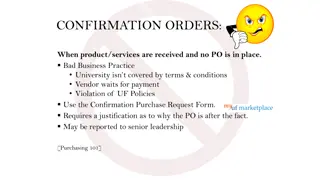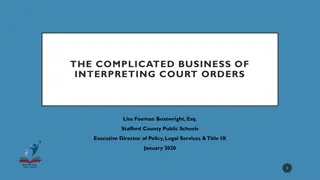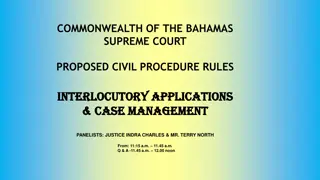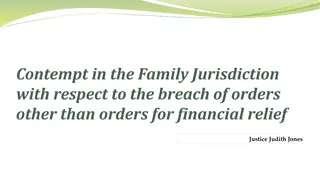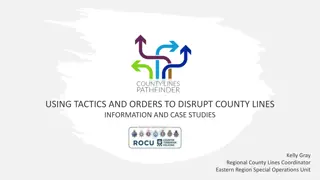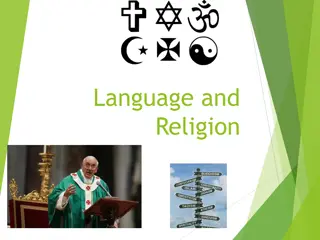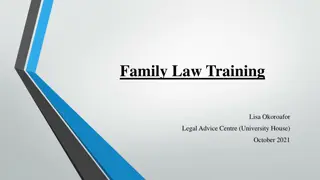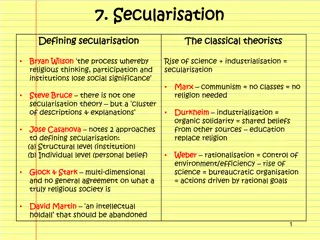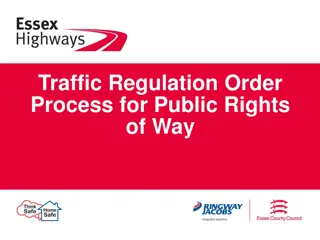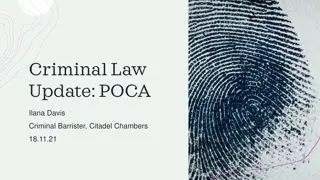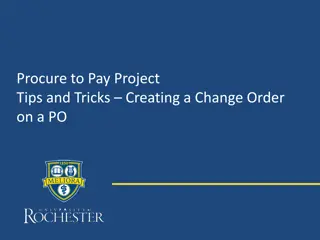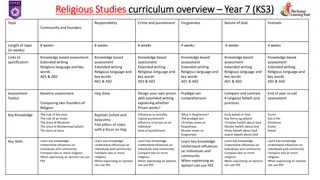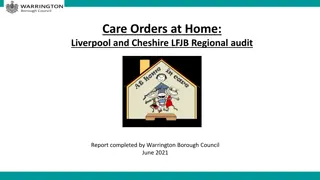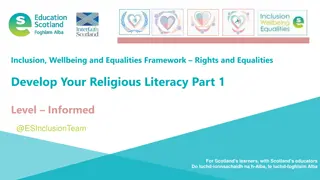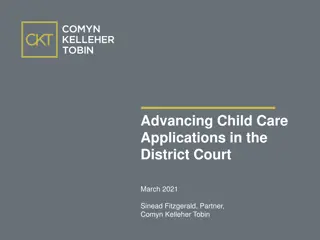Understanding the Rite of Profession for Formation in Religious Orders
The Rite of Profession plays a vital role in the formation process for those entering religious orders, emphasizing the significance of commitment, rituals, sacraments, and essential elements such as questioning, symbols, and assent. It serves as an instructive and affirming experience for individua
0 views • 21 slides
Status of Family Laws in India: Hindu vs. Religious Minorities
The family and personal status laws in India vary between Hindu law and those pertaining to religious minorities. While Hindu law has seen extensive reforms, discriminatory provisions still exist. In contrast, laws governing religious minorities have undergone fewer reforms, leading to greater inequ
2 views • 4 slides
Addressing Gender-Based Violence in Windhoek, Namibia: Enhancing Protection Order Enforcement
Exploring the challenges and shortcomings in enforcing protection orders related to gender-based violence in Windhoek, Khomas Region, Namibia. The team members from various health and public service sectors collaborate to tackle issues like complicated application procedures, delays in serving prote
4 views • 12 slides
Constitutional Court judgments with suspended orders.
The Constitutional Court in South Africa has issued judgments with suspended orders in various cases relating to Acts that were deemed inconsistent with the Constitution. Orders in cases like the Riotous Assemblies Act and Drugs and Drug Trafficking Act are set to lapse on specific dates unless the
4 views • 44 slides
Understanding Religious Conflict: Definition and Types Explored
Religious conflict is a complex and recurring concept throughout history. Scholars have defined it as disagreements between religious groups. This conflict arises from contentious issues touching on ideology, morality, power, and identity, influenced by various socio-political, economic, and cultura
1 views • 13 slides
Evolution of Akbar's Religious Policy: A Historical Overview
In the 16th century, Akbar the Great implemented a revolutionary religious policy in the Mughal Empire. Initially a devout Sunni Muslim, Akbar evolved his stance to promote harmony and equality among all religions, fostering tolerance and understanding. This shift marked a significant departure from
1 views • 25 slides
Elizabethan Religious Settlement: Unity Amidst Division
Amid religious division in England, Queen Elizabeth I implemented a Religious Settlement in 1559 to unify the country. The settlement, a blend of Protestant and Catholic elements, aimed to maintain peace and prevent rebellions. Elizabeth's strategic compromise pleased most people, though lingering t
0 views • 14 slides
Understanding Secularism: Principles and Advantages
Secularism is the principle of separating government institutions from religious entities to ensure equal rights for believers and non-believers. It safeguards freedom of religious belief and practice, upholds religious freedom, and promotes democracy and fairness. Secularism aims to prevent religio
0 views • 21 slides
Effective Management of Confirmation Orders in University Procurement
University procurement processes should strictly adhere to policies regarding confirmation orders to avoid unauthorized purchases and ensure compliance with procurement directives. Violations can lead to financial risks and non-compliance. Proper awareness, communication, and adherence to procedures
2 views • 5 slides
Understanding Court Orders and Custody Arrangements in Virginia Public Schools
Exploring the complexities of interpreting court orders in educational settings, focusing on custody orders, visitation schedules, and legal responsibilities. The article delves into different types of court orders, Virginia's child custody laws, and the legal framework that guides school staff in h
0 views • 32 slides
Understanding Religious Language: Cognitivism vs. Non-Cognitivism in the University Debate
This discussion explores the debate between cognitivism and non-cognitivism in religious language. Cognitivism asserts that religious claims aim to describe the world and can be true or false, while non-cognitivism argues that such claims express attitudes and cannot be verified. Flew's challenge qu
0 views • 9 slides
Cadet's General Orders in Military Training
Explore the essential cadet general orders in military training, encompassing duties like taking charge of posts, remaining vigilant, reporting violations, and giving alarms. These orders emphasize discipline, responsibility, and prompt action to uphold organizational standards.
0 views • 13 slides
Bahamian Supreme Court Proposed Civil Procedure Rules on Interlocutory Applications
The Commonwealth of The Bahamas Supreme Court has proposed rules regarding interlocutory applications, which involve applications for court orders made at various stages of legal proceedings. These rules outline the process for making such applications, including the grounds required, drafting of or
3 views • 22 slides
Contempt in the Family Jurisdiction with Respect to Breach of Orders
The concept of contempt in the family jurisdiction regarding the breach of court orders other than those for financial relief is crucial for upholding the due administration of justice. Courts have the authority to punish for contempt to safeguard their processes and ensure compliance with their ord
0 views • 17 slides
Using Tactics and Orders to Disrupt County Lines: Case Studies and Strategies
Exploring the approach of using tactics and orders to disrupt county lines, this content outlines the Drug Dealing Telecommunications Restriction Order (DDTRO) process and its impact on drug supply chains. Case studies like the successful DDTRO conducted by the North West Regional Organised Crime Un
0 views • 21 slides
Guide to Using the BSA Calendar of Religious Observances
The BSA Calendar of Religious Observances is a valuable resource for scheduling scouting events in consideration of various religious holidays and observances. This guide provides an overview of the calendar, highlights important dates, and emphasizes the importance of respecting religious diversity
0 views • 8 slides
Understanding the Role of Language in Religion
Exploring the significance of language in religious contexts, this content discusses the functions, features, lexicon, grammar, and metaphorical aspects present in religious language. It delves into how religious language upholds spiritual beliefs, persuades believers, and expresses specific attitud
0 views • 8 slides
Understanding the Cultural Dimensions of Food and Religious Influences in Culinary Arts
Explore the impact of religious beliefs on food traditions and dietary restrictions across different cultures in the culinary world. Learn about the influence of major world religions on eating habits, food choices, and culinary practices. Discover how various religious groups, such as Christians, o
0 views • 26 slides
The Vital Role of Religious Institutions in Supporting Immigrants
Religions and immigration are interlinked in modern societies, where religions play a significant role in providing services, defending rights, and supporting the social cohesion of immigrants. Mainstream religious institutions serve as key actors in offering assistance, advocating for migrant right
2 views • 14 slides
Understanding Religious Language: Flew, Hare, Mitchell
Exploring the contrasting views of cognitivism and non-cognitivism in the context of religious language through the perspectives of Flew, Hare, and Mitchell. Delve into Flew's challenge on the undetectable gardener, Hare's concept of bliks, and Mitchell's response to the rationality of religious bel
0 views • 7 slides
Religious Accommodation in the Army: Advising Command
The content discusses the role of the Chaplain Corps in advising Soldiers and leaders on religious accommodation in the Army as of February 13, 2019. It covers learning objectives, legal foundations, Army policies, procedures, recent changes, and references related to religious accommodation. The in
0 views • 36 slides
Understanding Gun Violence Restraining Orders (GVRO) in Culver City
Gun Violence Restraining Orders (GVRO) are civil court orders requested by law enforcement and select civilians to temporarily remove firearms from individuals who pose a danger to themselves or others. This order prohibits the possession, control, purchase, or receipt of firearms, ammunition, and m
0 views • 10 slides
Understanding Non-Molestation Orders and Domestic Violence under Family Law
Family Law Training session covers Non-molestation orders, Occupation orders, and Interviewing Domestic Violence victims under the Family Law Act 1996. It elaborates on the granting of non-molestation orders, associated persons, molestation definition, and the impact of molestation on health and wel
0 views • 38 slides
Understanding Religious Discrimination Laws in California Workplace
Learn about the regulations and protections under FEHA and Title VII in California, including religious exemptions, accommodation requirements, case studies, and best practices to address discrimination issues effectively. Discover the statistical insights on religious discrimination complaints and
0 views • 45 slides
Understanding Secularisation: The Decline of Religious Influence in Society
Secularisation refers to the process in which religious thinking, participation, and institutions lose their social significance. This phenomenon is influenced by factors such as the rise of science, industrialisation, changing social attitudes, and the disengagement of the church from society. Evid
0 views • 8 slides
Philosophers' Views on Religious Experience: Insights and Critiques
This lesson delves into the perspectives of various philosophers such as Rudolph Otto, Richard Swinburne, John Hick, and Michael Persinger on religious experiences. It explores concepts like the numinous, religious knowledge, God's existence, and criticisms on the validity of religious experiences.
0 views • 7 slides
Philosophers' Views on Religious Experience: Insights from William James
Explore William James' perspective on religious experiences, including his views on existential and value judgments. Understand how James argued for the validity of religious experiences and their potential proof of God's existence. Delve into the implications of emotions and prior beliefs on interp
0 views • 7 slides
Religious and Social Conflicts Fueling the Rise of Absolutism in Europe
Social, economic, and religious conflicts in Europe played a significant role in the emergence of absolutism where monarchs wielded supreme power without sharing it with legislative bodies. Events like Spain's religious conflicts, Protestantism in England, the Spanish Armada, religious conflict in t
0 views • 10 slides
Religious Pluralism and Civil Society: A Paradox in Government Control
Understanding the intricacies of religious pluralism in the context of government control reveals a paradox where restricting religion can hinder social cohesion and economic growth. Through insights on the counterproductivity of control, the role of religious organizations in civil society, and the
0 views • 16 slides
US Religious Freedom Restoration Act (RFRA) Overview
The US Religious Freedom Restoration Act (RFRA) aims to protect the free exercise of religion by ensuring that governments do not substantially burden religious practices without compelling justification. It emphasizes striking a balance between religious liberty and governmental interests through t
0 views • 9 slides
Traffic Regulation Orders for Public Rights of Way in Essex
Traffic Regulation Orders (TROs) are essential for temporarily or permanently restricting public rights of way in Essex under the Road Traffic Regulation Act 1984. Temporary Traffic Regulation Orders (TTROs) are used for short-term restrictions due to works or safety reasons. The TTRO process involv
0 views • 15 slides
Guide to Using HUPX Intraday Basket Function
The HUPX Intraday Basket panel allows for the simultaneous entry of multiple orders. Orders in the basket can be submitted with various submission restrictions for efficient trading. Users can perform actions on existing orders and import orders via CSV files. Follow comprehensive steps to utilize t
0 views • 10 slides
Overview of POCA Applications and Restraint Orders in Criminal Law
This collection of information delves into the application of Proceeds of Crime Act (POCA) in criminal investigations, focusing on topics such as Restraint Orders, Discharge, POCA Timetable, Benefit Figures, Available Amount determination, Making Confiscation Orders, Enforcement, Enforcement Receive
0 views • 27 slides
Efficient Tips for Creating Change Orders on Purchase Orders
Explore useful tips and tricks for efficiently creating change orders on purchase orders, including reasons for modifications, accessing the change order feature, updating information, setting issue options, and adding internal memos. Learn how to make changes for internal processes and ensure smoot
0 views • 9 slides
Religious Studies Curriculum Overview for Year 7 and 8 (KS3)
Explore various topics such as responsibility, crime and punishment, forgiveness, nature of God, festivals, community, founders, worship, creation, life after death, rules and laws, relationships in this detailed Year 7 and 8 (KS3) Religious Studies curriculum. The curriculum includes assessments, e
0 views • 6 slides
Understanding Child Arrangements Orders in Family Law
This session on Family Law Training covers various types of court orders related to child arrangements, such as Child Arrangements Orders (CAO), Prohibited Steps Orders, and Specific Issue Orders. It explains who can apply for a CAO under the Children Act 1989 and the implications of non-compliance
0 views • 48 slides
Regional Audit Report on Care Orders at Home in Liverpool and Cheshire - June 2021
LFJB Regional audit report completed by Warrington Borough Council highlighted the high number of children living at home with care orders in the North West region. The report focuses on the period between 2017 and 2021, aiming to identify common themes and lessons across local authorities. The meth
0 views • 22 slides
Developing Religious Literacy for Educators in Scotland
This resource aims to enhance educators' understanding of religious literacy by exploring religious discrimination, core beliefs of major faiths, and additional learning sources. It encourages educators to consider the needs of learners in relation to their religious beliefs in Scotland.
0 views • 30 slides
Understanding Child Care Orders in the District Court
Exploring the essential aspects of child care orders in the District Court, including the power of Garda Síochána to take a child to safety, emergency care orders, interim care orders, and care orders. These orders aim to protect children at risk and ensure their welfare is paramount, with procedu
0 views • 49 slides
Settling the Northern Colonies: Religious Transformation and Colonization
The Protestant Reformation led to the emergence of Puritanism in the Northern Colonies, with figures like Martin Luther and John Calvin shaping religious beliefs. The Massachusetts Bay Colony stood as a beacon of self-government and religious ideals, while dissenters like Anne Hutchinson and Roger W
0 views • 9 slides








